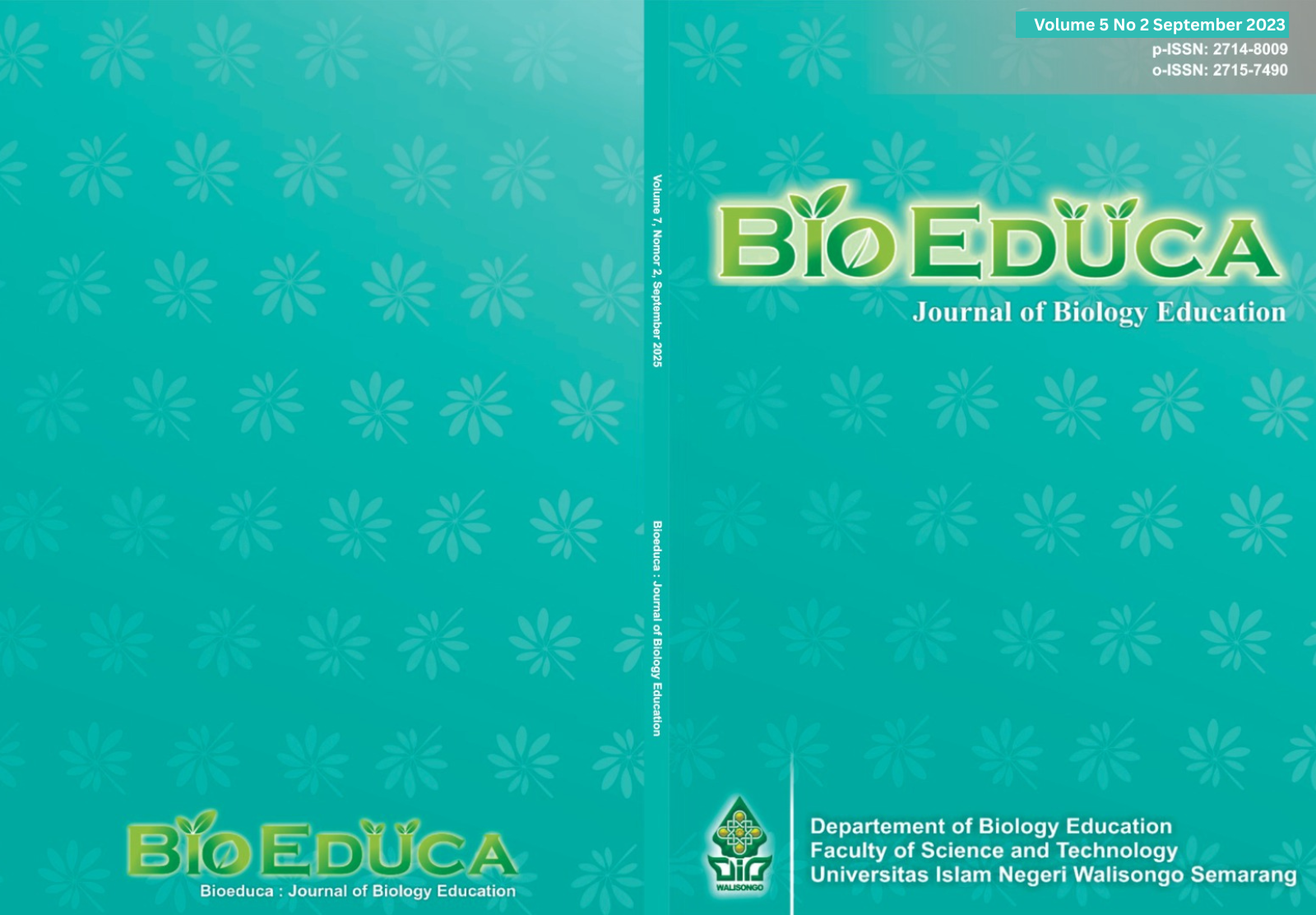Increasing Students' Creative Thinking Through Differentiated Learning with an CRT-Integrated PjBL Model
Main Article Content
Abstract
Downloads
Article Details
The copyright of the received article shall be assigned to the journal as the publisher of the journal. The intended copyright includes the right to publish the article in various forms (including reprints). The journal maintains the publishing rights to the published articles. Authors are allowed to use their articles for any legal purposes deemed necessary without written permission from the journal with an acknowledgment of initial publication to this journal.

This work is licensed under a Creative Commons Attribution-ShareAlike 4.0 International License.
References
Al-Balushi, S. M., & Al-Aamri, S. S. (2014). The effect of environmental science projects on students environmental knowledge and science attitudes. International Research in Geographical and Environmental Education, 23(3), 213–227. https://doi.org/10.1080/10382046.2014.927167
Anggareni, P., & Hidayat, A. F. (2022). Students creative thinking skills on differentiated instruction. International Journal of Trends in Mathematics Education Research, 5(4), 365–373. https://doi.org/10.33122/ijtmer.v5i4.161
Astuti, A., Waluya, S. B., & Asikin, M. (2020). the Important of Creative Thinking Ability in Elementary School Students for 4.0 Era. International Journal of Educational Management and Innovation, 1(1), 91. https://doi.org/10.12928/ijemi.v1i1.1512
Biazus, M. de O., & Mahtari, S. (2022). The Impact of Project-Based Learning (PjBL) Model on Secondary Students’ Creative Thinking Skills. International Journal of Essential Competencies in Education, 1(1), 38–48. https://doi.org/10.36312/ijece.v1i1.752
Bobi, C. B., & Ahiavi, M. A. (2023). Using Differentiated Instruction to Promote Creativity, Critical Thinking and Learning: Perspective of Teachers. Journal of Education and Practice, 7(2), 1–30. https://doi.org/10.47941/jep.1227
Ersoy, E., & Başer, N. (2014). The Effects of Problem-based Learning Method in Higher Education on Creative Thinking. Procedia - Social and Behavioral Sciences, 116, 3494–3498. https://doi.org/10.1016/j.sbspro.2014.01.790
Fardhila, R. R., & Istiyono, E. (2019). An assessment instrument of mind map product to assess students’ creative thinking skill. Research and Evaluation in Education, 5(1), 41–53. https://doi.org/10.21831/reid.v5i1.22525
Gaitas, S., & Alves Martins, M. (2017). Teacher perceived difficulty in implementing differentiated instructional strategies in primary school. International Journal of Inclusive Education, 21(5), 544–556. https://doi.org/10.1080/13603116.2016.1223180
Gay, G. (2015). The what, why, and how of culturally responsive teaching: International mandates, challenges, and opportunities. Multicultural Education Review, 7(3), 123–139. https://doi.org/10.1080/2005615X.2015.1072079
Greenstein, L. (2012). Assessing 21st century skills: A guide to evaluating mastery and authentic learning. Assessing 21st Century Skills: A Guide to Evaluating Mastery and Authentic Learning.
Hake, R. R. (1999). Analyzing change/gain scores. Unpublished.[Online] URL: Http://Www. Physics. Indiana. Edu/~ Sdi/AnalyzingChange-Gain. Pdf.
Handayani, S. A., Rahayu, Y. S., & Agustini, R. (2021). Students’ creative thinking skills in biology learning: Fluency, flexibility, originality, and elaboration. Journal of Physics: Conference Series, 1747(1). https://doi.org/10.1088/1742-6596/1747/1/012040
Herwina, W. (2021). Optimalisasi Kebutuhan Murid Dan Hasil Belajar Dengan Pembelajaran Berdiferensiasi. Perspektif Ilmu Pendidikan, 35(2), 175–182. https://doi.org/10.21009/pip.352.10
Islamiati, N., & Irfan, M. (2022). Pengaruh Model Pembelajaran Project Based Learning (PjBL) Berbasis Etnomatematika Terhadap Kemampuan Berpikir Kreatif Siswa. Proximal: Jurnal Penelitian Matematika Dan Pendidikan Matematika, 5(2), 1–7. https://doi.org/https://doi.org/10.30605/proximal.v5i2.1779
Kemendikbud. (2022). Kajian Akademik Kurikulum untuk Pemulihan Pembelajaran (Edisi 1). Pusat Kurkulum dan Pengembangan Kemendikbutristek RI.
Kemmis, S., & McTaggart, R. (2007). Participatory action research and the public sphere. Educational Action Research, 14(4), 459–476. https://doi.org/10.1080/09650790600975593
Nita, R. S., & Irwandi. (2021). Peningkatan Keterampilan Berpikir Kreatif Siswa melalui Model Project Based Learning (PjBL). BIOEDUSAINS: Jurnal Pendidikan Biologi Dan Sains, 4(2), 231–238.
Nurhikmayati, I., & Sunendar, A. (2020). Pengembangan Project Based Learning Berbasis Kearifan Lokal Berorientasi pada Kemampuan Berpikir Kreatif dan Kemandirian Belajar Mosharafa : Jurnal Pendidikan Matematika Mosharafa : Jurnal Pendidikan Matematika. Mosharafa : Jurnal Pendidikan Matematika, 9(1), 1–12.
Putri, S. U., Sumiati, T., & Larasati, I. (2018). Improving creative thinking skill through project-based-learning in science for primary school. Journal of Physics: Conference Series, 1157(2). https://doi.org/10.1088/1742-6596/1157/2/022052
Soselisa, C. M., Rusijono, & Bachri, B. S. (2019). Station Rotation Method Based on Differentiated Instruction to Improve Higher Order Thinking Skills. 3rd International Conference on Education Innovation (ICEI 2019), 387(Icei), 109–112. https://doi.org/10.2991/icei-19.2019.26
Subban, P. (2006). Differentiated instruction : A research basis. International Education Journal, 7(7), 935–947.
Syahrin, A., Dawud, Suwignyo, H., & Priyatni, E. T. (2019). Creative thinking patterns in student‘s scientific works. Eurasian Journal of Educational Research, 2019(81), 21–36. https://doi.org/10.14689/ejer.2019.81.2
Tomlinson, C. A. (2005). Grading and differentiation: Paradox or good practice? Theory into Practice, 44(3), 262–269. https://doi.org/10.1207/s15430421tip4403_11
UmiKalsom Masrom, & Dahlia Syahrani Md. Yusof. (2013). English games as a constructivist approach in project based learning. International Journal of Social Science and Humanities Research, 1(1), 21–25.
Yamin, Y., Permanasari, A., Redjeki, S., & Sopandi, W. (2020). Project Based Learning To Enhance Creative Thinking Skills of the Non-Science Students. Jhss (Journal of Humanities and Social Studies), 4(2), 107–111. https://doi.org/10.33751/jhss.v4i2.2450
Yunita, Y., Juandi, D., Nurhidayah, I. J., Wibowo, F. C., Astra, I. M., Diana, N., & Sukma, Y. (2021). Impact of Project Based Learning on Creative Thinking Skills and Student Learning Outcomes Impact of Project Based Learning on Creative Thinking Skills and Student Learning Outcomes. Journal of Physucs; Conference Series, 1–8. https://doi.org/10.1088/1742-6596/1940/1/012114
Zubaidah, S., & Arsih, F. (2021). Indonesian culture as a means to study science. AIP Conference Proceedings, 030037(March), 1–7. https://doi.org/https://doi.org/10.1063/5.0043173
Zubaidah, S., Fuad, N. M., Mahanal, S., & Suarsini, E. (2017). Improving creative thinking skills of students through Differentiated Science Inquiry integrated with mind map. Journal of Turkish Science Education, 14(4), 77–91. https://doi.org/10.12973/tused.10214a

